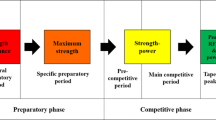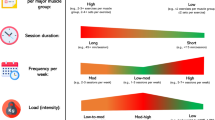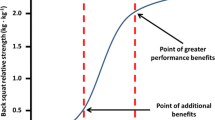Abstract
The effect of maximal voluntary isometric strength training of knee extensor muscles on pulmonary V′O2 on-kinetics, the O2 cost of cycling and peak oxygen uptake (V′O2peak) in humans was studied. Seven healthy males (mean ± SD, age 22.3 ± 2.0 years, body weight 75.0 ± 9.2 kg, V′O2peak 49.5 ± 3.8 ml kg−1 min−1) performed maximal isometric strength training lasting 7 weeks (4 sessions per week). Force during maximal voluntary contraction (MVC) increased by 15 % (P < 0.001) after 1 week of training, and by 19 % (P < 0.001) after 7 weeks of training. This increase in MVC was accompanied by no significant changes in the time constant of the V′O2 on-kinetics during 6 min of moderate and heavy cycling intensities. Strength training resulted in a significant decrease (by ~7 %; P < 0.02) in the amplitude of the fundamental component of the V′O2 on-kinetics, and therefore in a lower O2 cost of cycling during moderate cycling intensity. The amplitude of the slow component of V′O2 on-kinetics during heavy cycling intensity did not change with training. Training had no effect on the V′O2peak, whereas the maximal power output reached at V′O2peak was slightly but significantly increased (P < 0.05). Isometric strength training rapidly (i.e., after 1 week) decreases the O2 cost of cycling during moderate-intensity exercise, whereas it does not affect the amplitude of the slow component of the V′O2 on-kinetics during heavy-intensity exercise. Isometric strength training can have beneficial effects on performance during endurance events.



Similar content being viewed by others
References
Ada L, Dorsch S, Canning CG (2006) Strengthening interventions increase strength and improve activity after stroke: a systematic review. Aust J Physiother 52:241–248
Astrand PO, Rodahl K (1986) Textbook of work physiology. Physiological bases of exercise, 3rd edn. McGraw-Hill, New York, pp 414–415
Barstow TJ, Jones AM, Nguyen PH, Casaburi R (1996) Influence of muscle fiber type and pedal frequency on oxygen uptake kinetics of heavy exercise. J Appl Physiol 81:1642–1650
Borrani F, Candau R, Millet GY, Perrey S, Fuchsloscher J, Rouillon JD (2001) Is the V′O2 slow component dependent on progressive recruitment of fast-twitch fibers in trained runners? J Appl Physiol 90:2212–2220
Brooks N, Layne JE, Gordon PL, Roubenoff R, Nelson ME, Castaneda-Sceppa C (2006) Strength training improves muscle quality and insulin sensitivity in Hispanic older adults with type 2 diabetes. Int J Med Sci 4:19–27
Cannon DT, White AC, Andriano MF, Kolkhorst FW, Rossiter HB (2011) Skeletal muscle fatigue precedes the slow component of oxygen uptake kinetics during exercise in humans. J Physiol (Lond) 589:727–739
Edwards RH, Young A, Hosking GP, Jones DA (1977) Human skeletal muscle function: description of tests and normal values. Clin Sci Mol Med 52:283–290
Frontera WR, Meredith CN, O’Reilly KP, Evans WJ (1990) Strength training and determinants of V′O2max in older men. J Appl Physiol 68:329–333
Goreham C, Green HJ, Ball-Burnett M, Ranney D (1999) High-resistance training and muscle metabolism during prolonged exercise. Am J Physiol 276:E489–E496
Grassi B, Porcelli S, Salvadego D, Zoladz JA (2011) Slow V′O2 kinetics during moderate-intensity exercise as markers of lower metabolic stability and lower exercise tolerance. Eur J Appl Physiol 111:345–355
Hickson RC, Rosenkoetter MA, Brown MM (1980) Strength training effects on aerobic power and short-term endurance. Med Sci Sports Exerc 12:336–339
Hickson RC, Dvorak BA, Gorostiaga EM, Kurowski TT, Foster C (1988) Potential for strength and endurance training to amplify endurance performance. J Appl Physiol 65:2285–2290
Hoff J, Tjønna AE, Steinshamn S, Høydal M, Richardson RS, Helgerud J (2007) Maximal strength training of the legs in COPD: a therapy for mechanical inefficiency. Med Sci Sports Exerc 39:220–226
Johnston RE, Guinn TJ, Kertzer R, Vroman NB (1997) Strength training in female distance runners: impact on running economy. J Strength Cond Res 11:224–229
Jones DA, Rutherford OM (1987) Human muscle strength training: the effects of three different regimens and the nature of the resultant changes. J Physiol (Lond) 391:1–11
Jones AM, Grassi B, Christensen PM, Krustrup P, Bangsbo J, Poole DC (2011) The slow component of V′O2 kinetics: mechanistic bases and practical applications. Med Sci Sports Exerc 43:2046–2062
Korzeniewski B, Zoladz JA (2001) A model of oxidative phosphorylation in mammalian skeletal muscle. Biophys Chem 92:17–34
Korzeniewski B, Zoladz JA (2003) Training-induced adaptation of oxidative phosphorylation in skeletal muscles. Biochem J 374:37–40
Korzeniewski B, Zoladz JA (2004) Factors determining the oxygen consumption rate (V′O2) on-kinetics in skeletal muscles. Biochem J 379:703–710
Lamarra N, Whipp BJ, Ward SA, Wasserman K (1987) Effect of interbreath fluctuations on characterizing exercise gas exchange kinetics. J Appl Physiol 62:2003–2012
Macaluso A, De Vito G (2004) Muscle strength, power and adaptations to resistance training in older people. Eur J Appl Physiol 91:450–472
Majerczak J, Korostynski M, Nieckarz Z, Szkutnik Z, Duda K, Zoladz JA (2012) Endurance training decreases the non-linearity in the oxygen uptake-power output relationship in humans. Exp Physiol 97:386–399
Marcinik EJ, Potts J, Schlabach G, Will S, Dawson P, Hurley BF (1991) Effects of strength training on lactate threshold and endurance performance. Med Sci Sports Exerc 23:739–743
McCarthy JP, Agre JC, Graf BK, Pozniak MA, Vailas AC (1995) Compatibility of adaptive responses with combining strength and endurance training. Med Sci Sports Exerc 27:429–436
Millet GP, Jaouen B, Borrani F, Candau R (2002) Effects of concurrent endurance and strength training on running economy and V′O2 kinetics. Med Sci Sports Exerc 34:1351–1359
Narici MV, Reeves ND, Morse CI, Maganaris CN (2004) Muscular adaptations to resistance exercise in the elderly. J Musculoskelet Neuronal Interact 4:161–164
Paavolainen L, Häkkinen K, Hämäläinen I, Nummela A, Rusko H (1999) Explosive-strength training improves 5-km running time by improving running economy and muscle power. J Appl Physiol 86:1527–1533
Poole DC, Wilkerson DP, Jones AM (2008) Validity of criteria for establishing maximal O2 uptake during ramp exercise tests. Eur J Appl Physiol 102:403–410
Rossiter HB (2011) Exercise: kinetics considerations for gas exchange. Compr Physiol 1:203–244
Rossiter HB, Ward SA, Kowalchuk JM, Howe FA, Griffiths JR, Whipp BJ (2001) Effects of prior exercise on oxygen uptake and phosphocreatine kinetics during high-intensity knee-extension exercise in humans. J Physiol (Lond) 537:291–303
Roston WL, Whipp BJ, Davis JA, Cunningham DA, Effros RM, Wasserman K (1987) Oxygen uptake kinetics and lactate concentration during exercise in humans. Am Rev Respir Dis 135:1080–1084
Sargeant AJ, de Haan A (2006) Human muscle fatigue: the significance of muscle fibre type variability studied using a micro-dissection approach. J Physiol Pharmacol 57(Suppl 10):5–16
Sargeant AJ, Jones DA (1995) The significance of motor unit variability in sustaining mechanical output of muscle. Adv Exp Med Biol 384:323–338
Saunders PU, Telford RD, Pyne DB, Peltola EM, Cunningham RB, Gore CJ, Hawley JA (2006) Short-term plyometric training improves running economy in highly trained middle and long distance runners. J Strength Cond Res 20:947–954
Støren O, Helgerud J, Støa EM, Hoff J (2008) Maximal strength training improves running economy in distance runners. Med Sci Sports Exerc 40:1087–1092
Sunde A, Støren O, Bjerkaas M, Larsen MH, Hoff J, Helgerud J (2010) Maximal strength training improves cycling economy in competitive cyclists. J Strength Cond Res 24:2157–2165
Taipale RS, Mikkola J, Nummela A, Vesterinen V, Capostagno B, Walker S, Gitonga D, Kraemer WJ, Häkkinen K (2010) Strength training in endurance runners. Int J Sports Med 31:468–476
Vanhatalo A, Poole DC, DiMenna FJ, Bailey SJ, Jones AM (2011) Muscle fiber recruitment and the slow component of O2 uptake: constant work rate vs. all-out sprint exercise. Am J Physiol Regul Integr Comp Physiol 300:R700–R707
Wang L, Mascher H, Psilander N, Blomstrand E, Sahlin K (2011) Resistance exercise enhances the molecular signaling of mitochondrial biogenesis induced by endurance exercise in human skeletal muscle. J Appl Physiol 111:1335–1344
Whipp BJ (1996) Domains of aerobic function and their limiting parameters. In: Steinacker JM, Ward SA (eds) The physiology and pathophysiology of exercise tolerance. Plenum Press, New York, pp 83–89
Whipp BJ, Rossiter HB, Ward SA (2002) Exertional oxygen uptake kinetics: a stamen of stamina? Biochem Soc Trans 30:237–247
Wilkinson SB, Phillips SM, Atherton PJ, Patel R, Yarasheski KE, Tarnopolsky MA, Rennie MJ (2008) Differential effects of resistance and endurance exercise in the fed state on signalling molecule phosphorylation and protein synthesis in human muscle. J Physiol (Lond) 586:3701–3717
Woledge RC (1988) Possible effects of fatigue on muscle efficiency. Acta Physiol Scand 162:267–273
Zatsiorsky VM (2003) Biomechanics of strength and strength training. In: Komi PV (ed) Strength and power in sport. Volume III of the encyclopaedia of sports medicine. IOC Medical Commission Publication, Blackwell Science, Oxford, pp 439–487
Zoladz JA, Rademaker ACHJ, Sargeant AJ (1995) Non-linear relationship between O2 uptake and power output at high intensities of exercise in humans. J Physiol (Lond) 488:211–217
Zoladz JA, Duda K, Majerczak J (1998) Oxygen uptake does not increase linearly at high power output of incremental exercise. Eur J Appl Physiol 5:445–451
Zoladz JA, Rademaker AC, Sargeant AJ (2000) Human muscle power generating capability during cycling at different pedalling rates. Exp Physiol 85:117–124
Zoladz JA, Szkutnik Z, Duda K, Majerczak J, Korzeniewski B (2005) Pre-exercise metabolic alkalosis induced via bicarbonate ingestion accelerates V′O2 kinetics at the onset of a high-power-output exercise in humans. J Appl Physiol 98:895–904
Zoladz JA, Korzeniewski B, Grassi B (2006) Training-induced acceleration of oxygen uptake kinetics in skeletal muscle: the underlying mechanisms. J Physiol Pharmacol 57(Suppl 10):67–84
Zoladz JA, Gladden LB, Hogan MC, Nieckarz Z, Grassi B (2008) Progressive recruitment of muscle fibers is not necessary for the slow component of V′O2 kinetics. J Appl Physiol 105:575–580
Acknowledgments
This study was supported by the funding from the University School of Physical Education in Krakow (Statutory research project 4/BS/KFiB/2011). Z. Szkutnik was also supported from AGH-UST local grant. B. Grassi was supported by a Grant from ASI-OSMA Contract I/007/06/0, WP 1B-32-1.
Conflict of interest
The authors declare that they have no conflict of interest.
Author information
Authors and Affiliations
Corresponding author
Additional information
Communicated by David C. Poole.
Rights and permissions
About this article
Cite this article
Zoladz, J.A., Szkutnik, Z., Majerczak, J. et al. Isometric strength training lowers the O2 cost of cycling during moderate-intensity exercise. Eur J Appl Physiol 112, 4151–4161 (2012). https://doi.org/10.1007/s00421-012-2405-x
Received:
Accepted:
Published:
Issue Date:
DOI: https://doi.org/10.1007/s00421-012-2405-x




